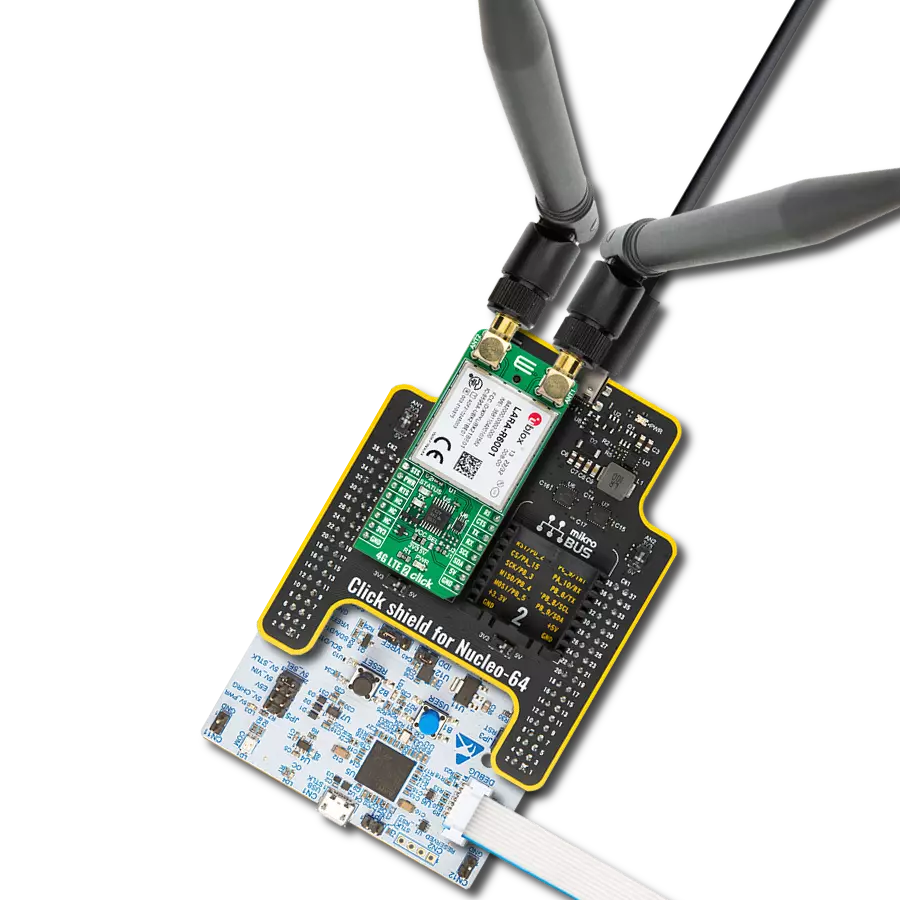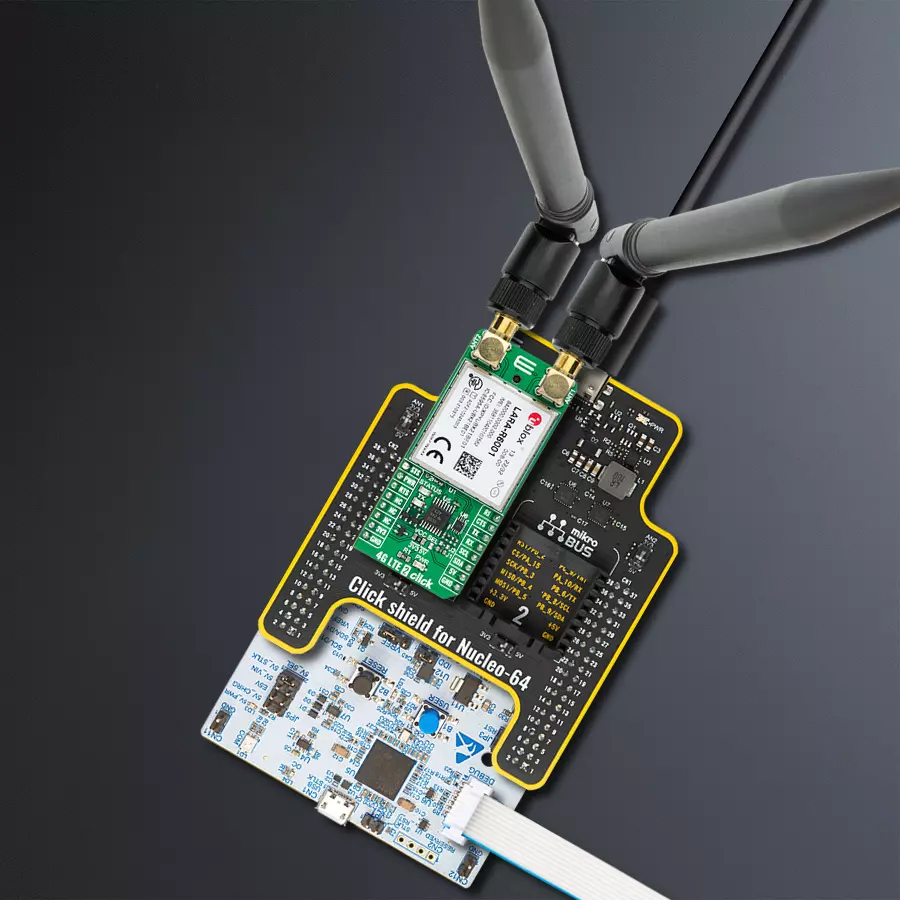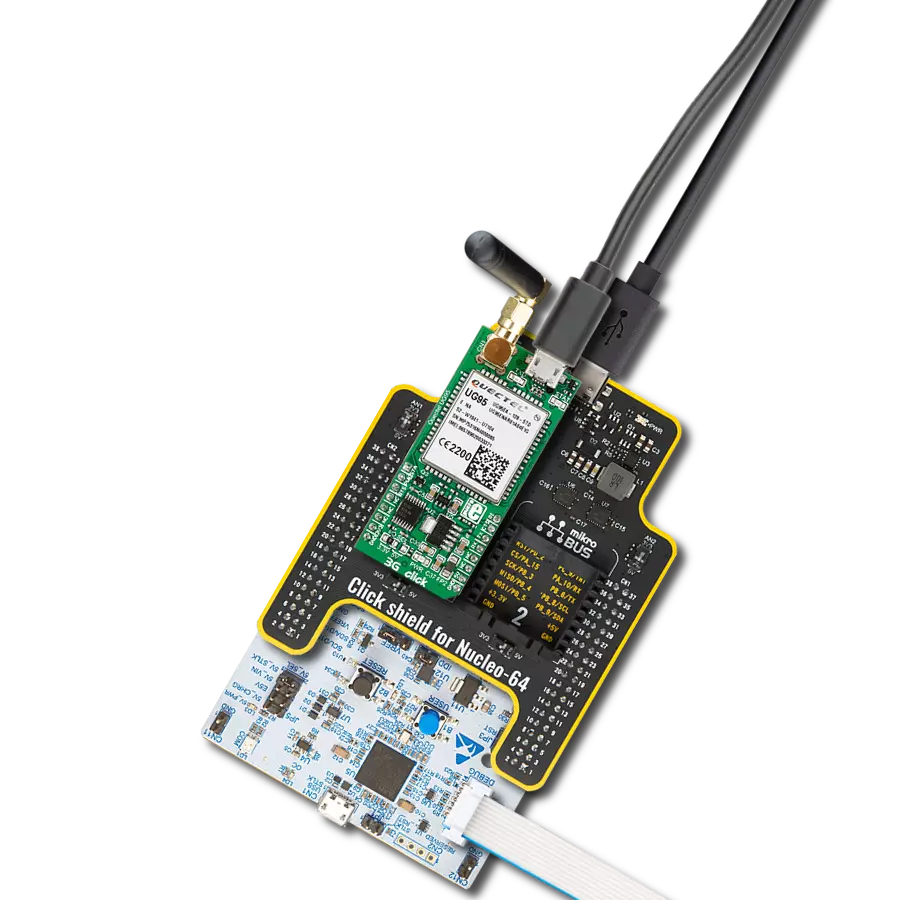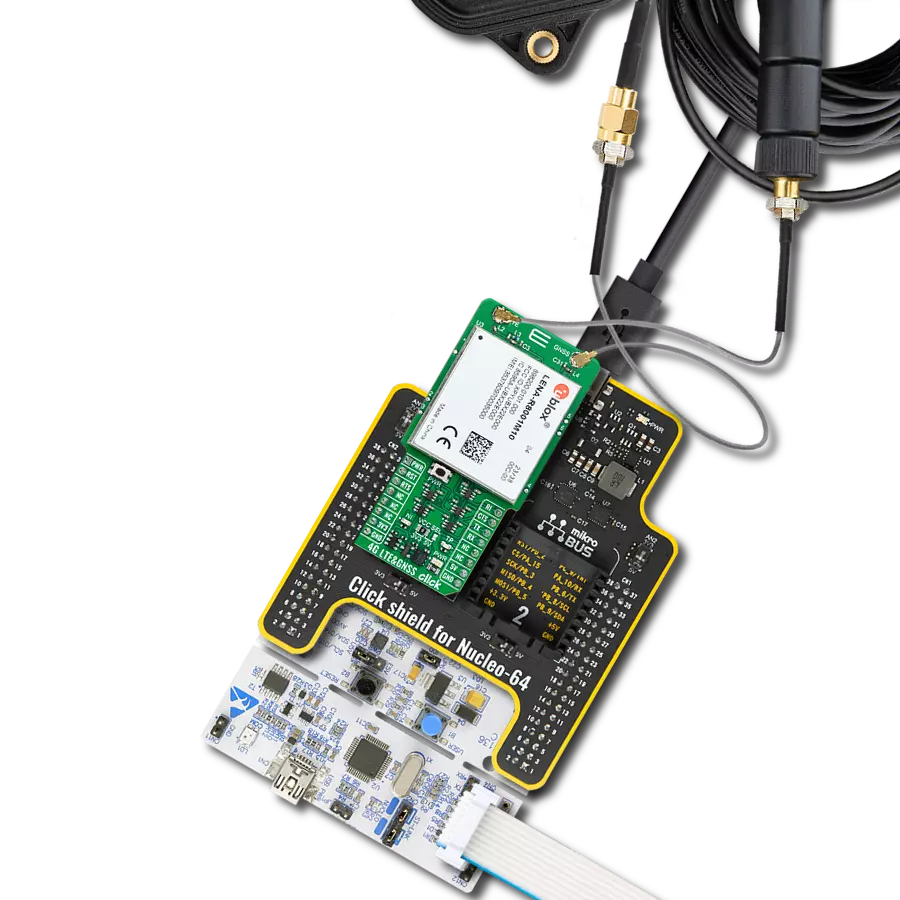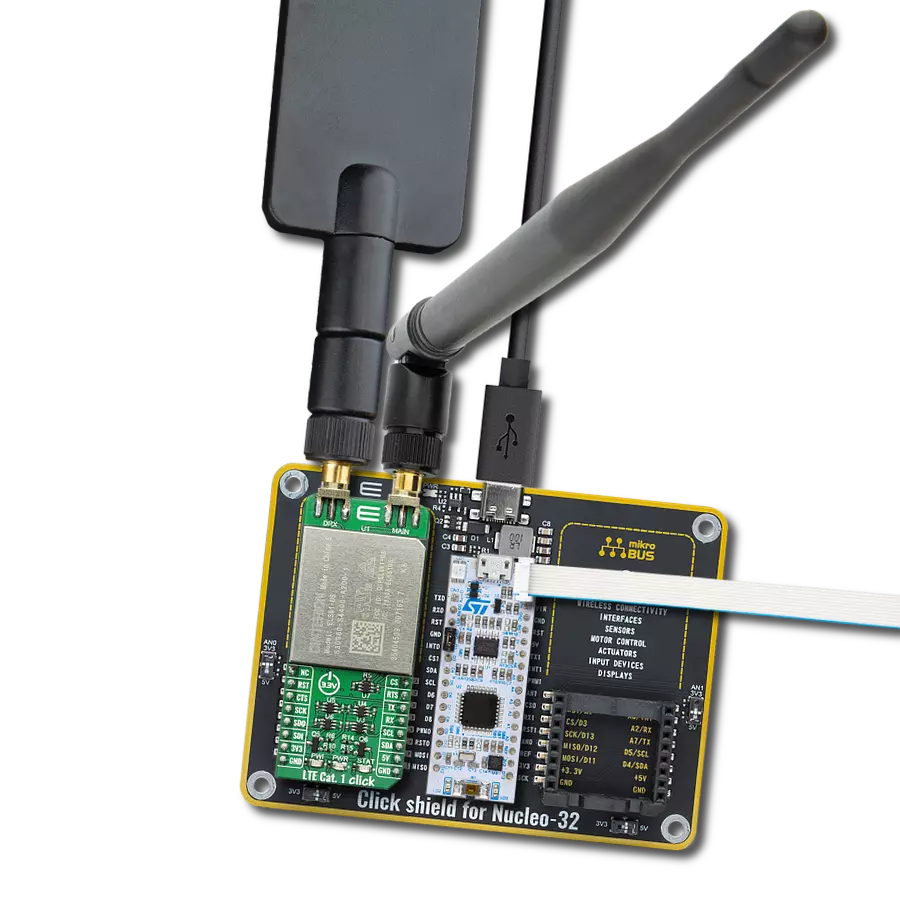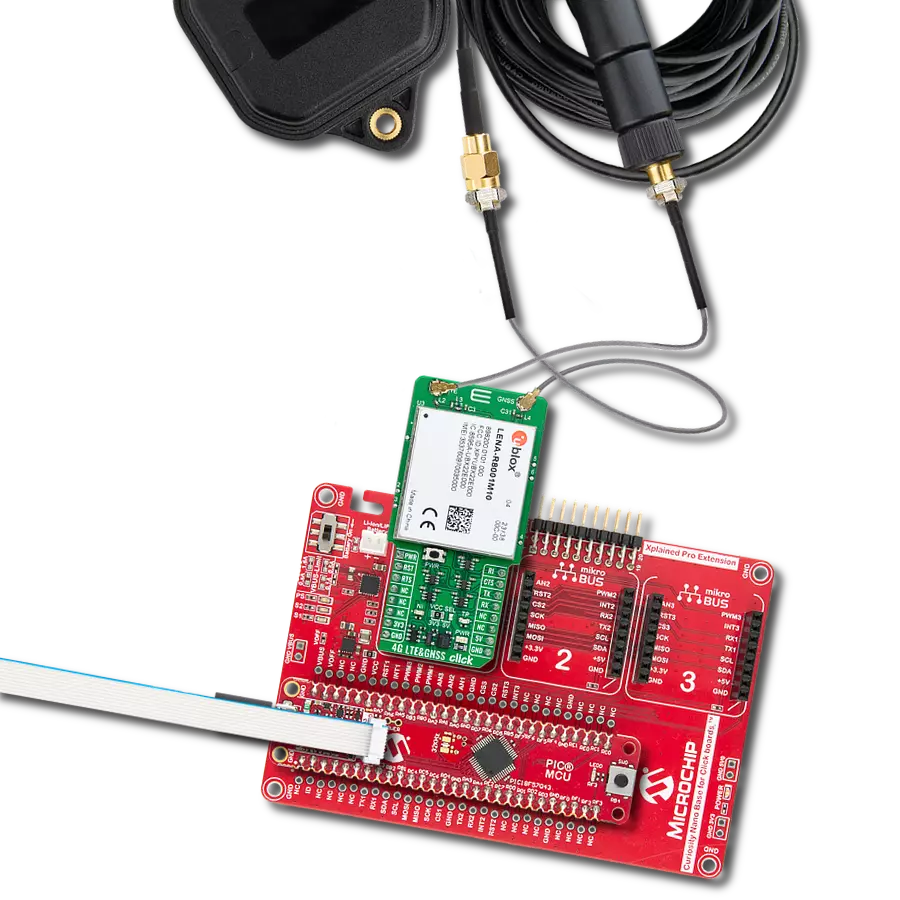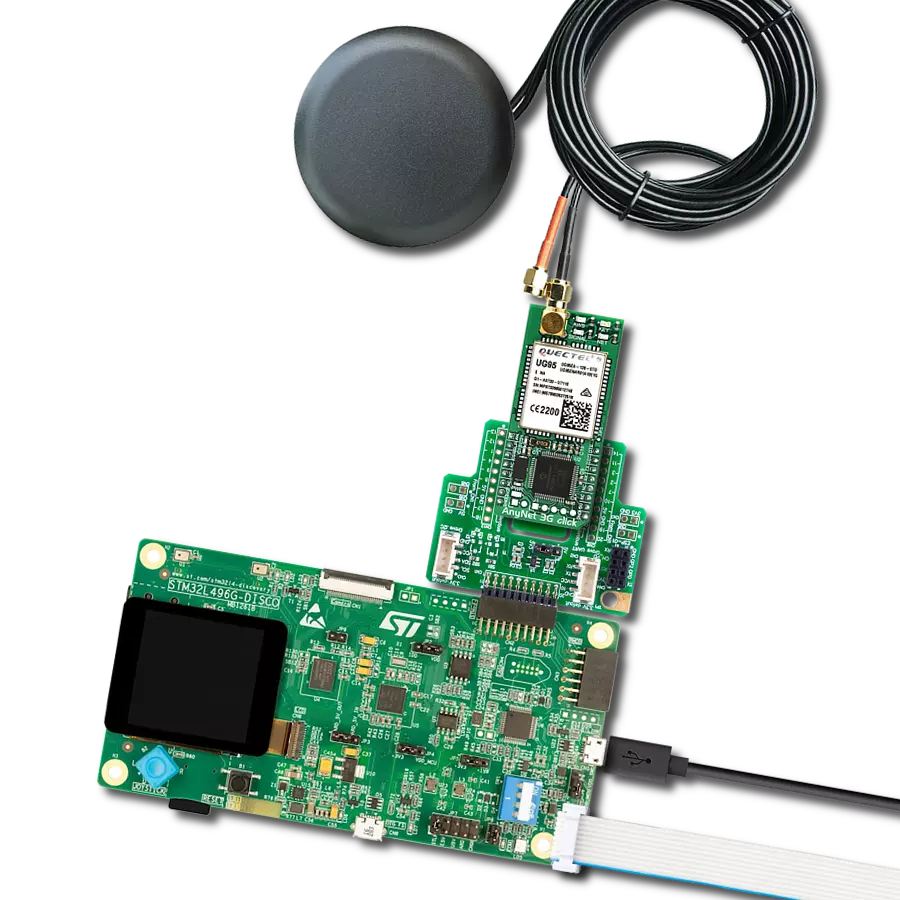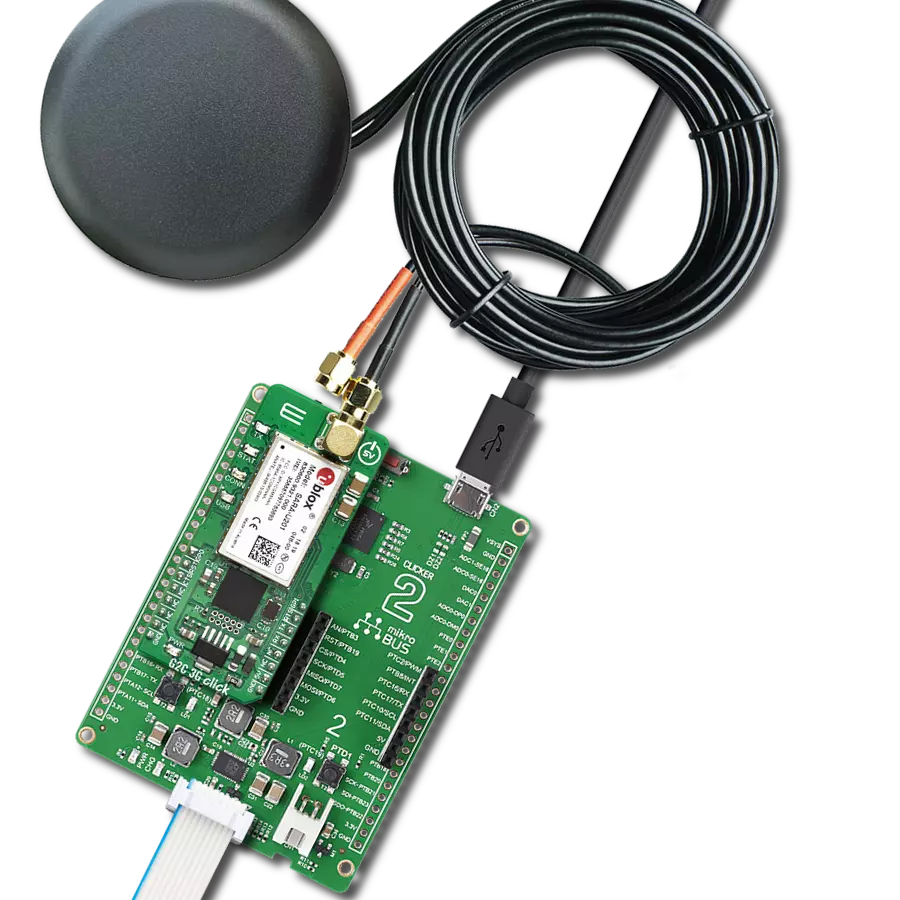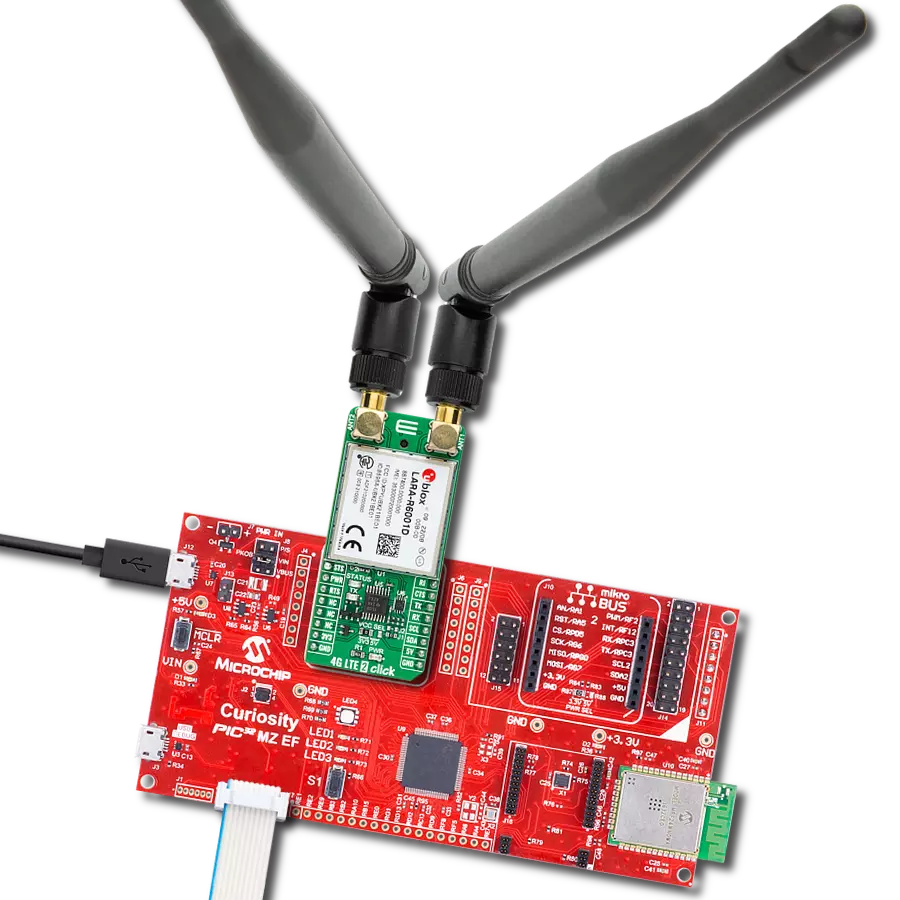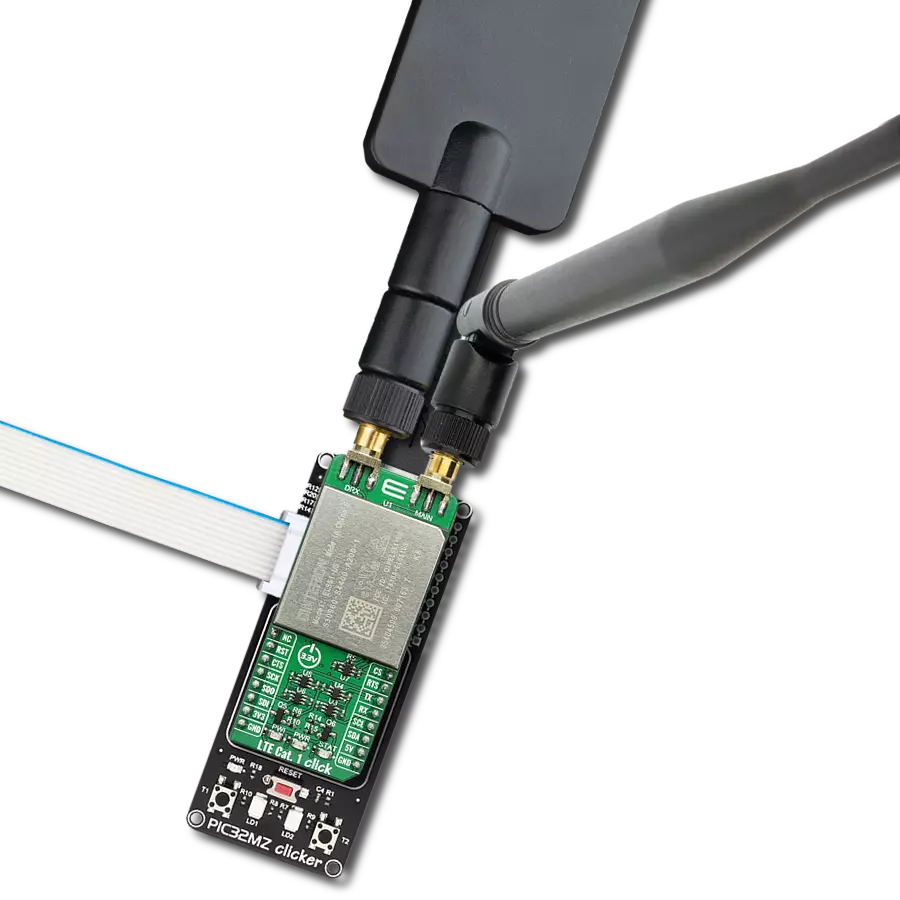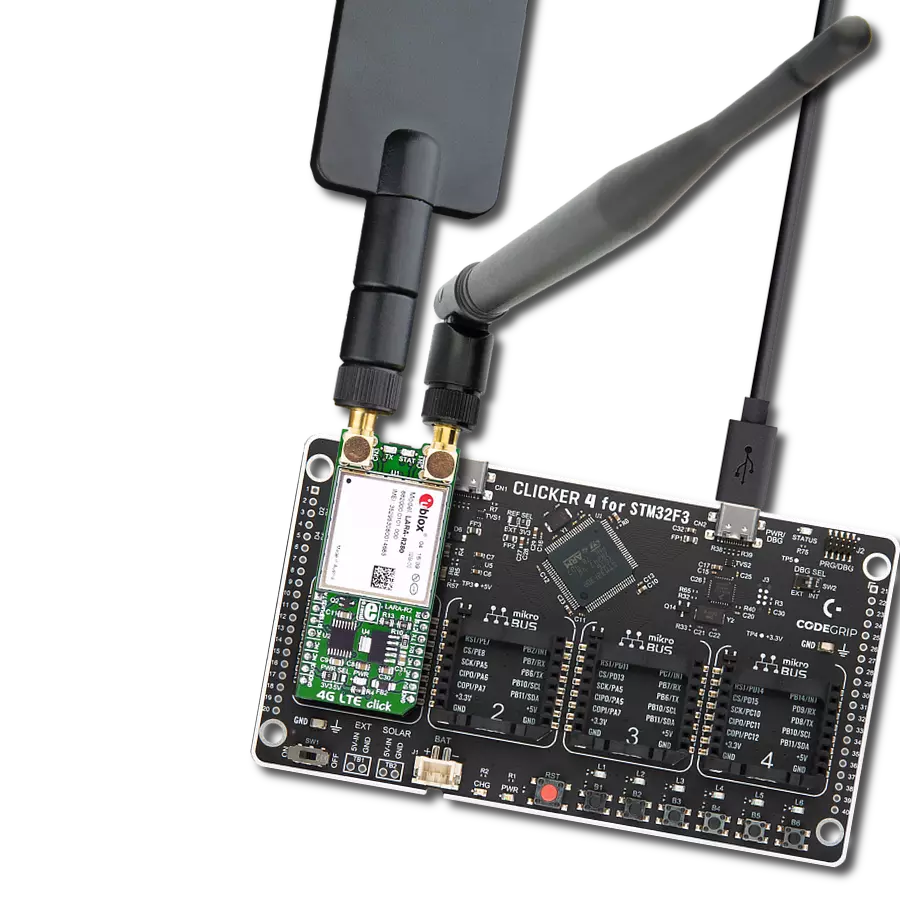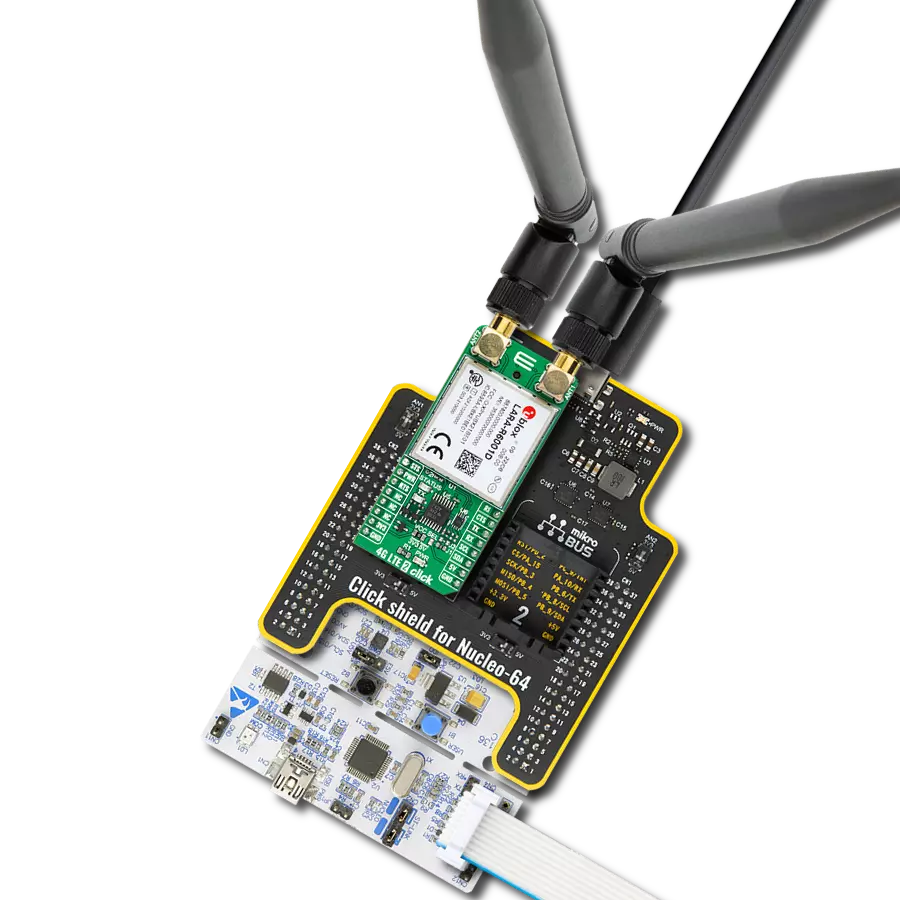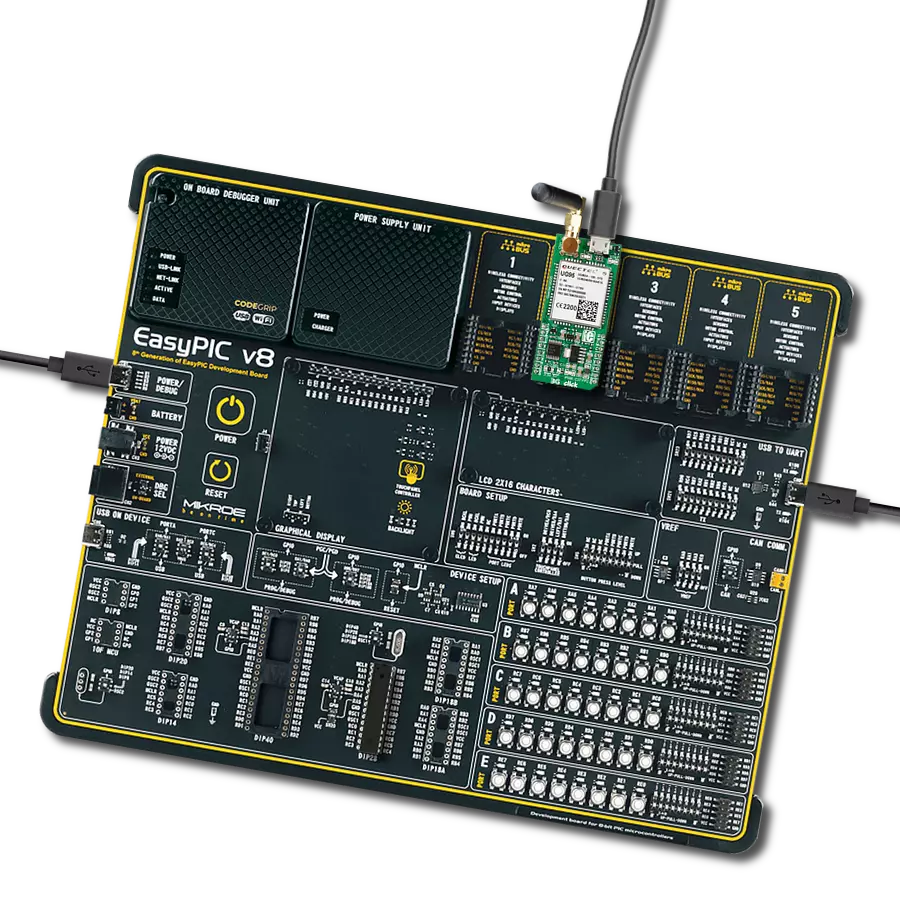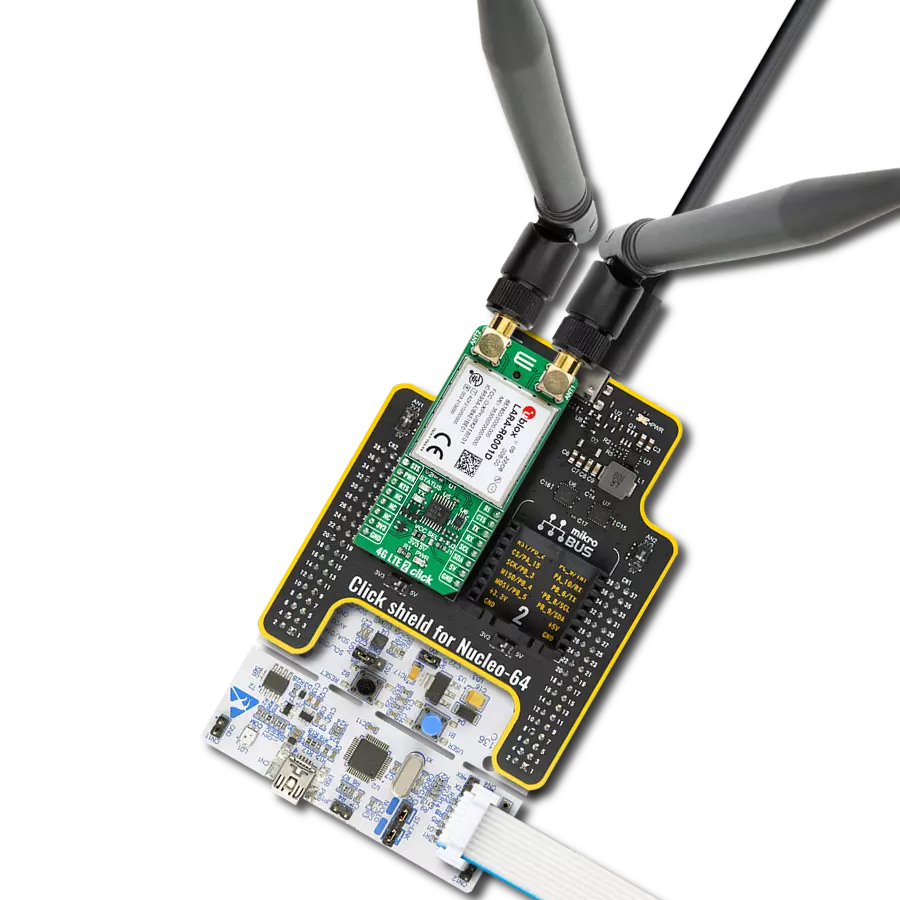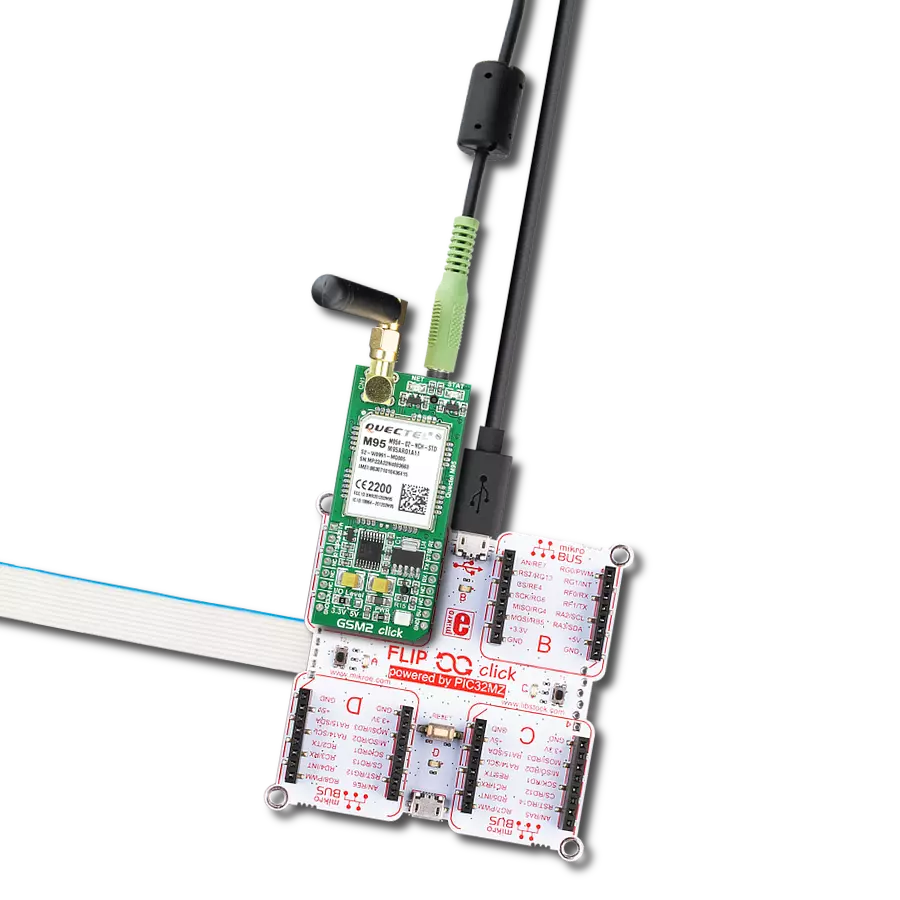全球覆盖的安全云VoLTE解决方案。
A
A
硬件概览
它是如何工作的?
4G LTE 2 Click - Voice基于Trasna的LARA-R6001,这是一款多频段和多模式模块。它支持LTE Cat 1 FDD和LTE Cat 1 TDD无线接入技术(18个LTE频段),同时支持3G UMTS/HSPA和2G GSM/GPRS/EGPRS后备,为全球连接提供了理想的解决方案。该Click board™代表了一种具有全球覆盖和所有相关MNO认证的数据和语音解决方案,提供了极大的灵活性。多功能的接口和功能使得LARA-R6001D非常适用于需要中等数据速度、优越覆盖范围和流媒体数据的各种应用,例如资产追踪、远程监控、销售终端等。LARA-R6001模块提供了Voice over LTE(VoLTE)和Circuit-Switched-Fall-Back(CSFB)从LTE到3G或2G无线承载的语音服务 - 通过板载3.5mm音频插孔进行访问。通过AT命令可以配置此音频接口,以便将数字音频数据传输到/从外部设备作为板载音频编解码器。该模块需要3.8V的电源供应。因此,Click board™集成了由德州仪器
提供的TPS7A7002集成型降压(降压DC-DC)转换器,它提供了稳定的3.8V电源,并且可以在输入端出现高电流峰值时减小电压下降(通常在设备启动时)。点火(上电)引脚标记为PWR,并路由到mikroBUS™插座上的RST引脚,使能够开关电源。LARA-R6001通过UART接口与MCU通信,该接口使用常用的UART RX和TX引脚,并具有用于硬件流控制的UART CTS、RTS、RI引脚(清除发送、准备发送和振铃指示)。默认情况下,它以115200 bps的速度运行,通过Trasna提供的AT命令与主机MCU进行数据传输和交换。除了UART接口,LARA-R6001还允许将I2C接口用作I2C主机,该接口可以遵循I2C总线规范与I2C本地设备通信。此Click board™还配备了一个USB Type C连接器,仅用于诊断目的。该模块是一个USB设备,可以连接到具有兼容驱动程序的任何USB主机。在使用的引脚中,此Click board™还具有两个额外的LED指示灯:黄色LED标记为
STATUS,同时路由到mikroBUS™ AN引脚(STS)和LED,用于直观地指示网络连接的状态;还有一个红色LED,标记为TX,用于指示模块的发送状态。LTE蜂窝网络使用空间复用天线技术,允许使用多于一个天线以获得更好的接收效果。因此,除了主要的TX/RX天线外,此Click board™还使用了一个辅助的多样性RX天线,这可以获得更好的信号接收效果。除了SMA连接器之外,4G LTE 2 Click还具有一个Nano-SIM卡槽,提供了多个连接和接口选项,同时还有几个标记为TP1到TP3的测试点,可实现模块的轻松重启和测试。该Click board™可以通过VCC SEL跳线选择3.3V或5V逻辑电压电平运行。通过这种方式,既可以使用3.3V也可以使用5V的MCU正确使用通信线路。然而,该Click board™配备了一个包含易于使用的功能和示例代码的库,可以用作进一步开发的参考。
功能概述
开发板
Nucleo-64 搭载 STM32G431RB MCU 提供了一种经济高效且灵活的平台,供开发者探索新想法并原型设计他们的项目。该板利用 STM32 微控制器的多功能性,使用户能够为他们的项目选择最佳的性能与功耗平衡。它配备了 LQFP64 封装的 STM32 微控制器,并包含了如用户 LED(同时作为 ARDUINO® 信号)、用户和复位按钮,以及 32.768kHz 晶体振荡器用于精确的计时操作等基本组件。Nucleo-64 板设计考虑到扩展性和灵活性,它特有的 ARDUINO® Uno
V3 扩展连接器和 ST morpho 扩展引脚头,提供了对 STM32 I/O 的完全访问,以实现全面的项目整合。电源供应选项灵活,支持 ST-LINK USB VBUS 或外部电源,确保在各种开发环境中的适应性。该板还配备了一个具有 USB 重枚举功能的板载 ST-LINK 调试器/编程器,简化了编程和调试过程。此外,该板设计旨在简化高级开发,它的外部 SMPS 为 Vcore 逻辑供电提供高效支持,支持 USB 设备全速或 USB SNK/UFP 全速,并内置加密功能,提升了项目的功效
和安全性。通过外部 SMPS 实验的专用连接器、 用于 ST-LINK 的 USB 连接器以及 MIPI® 调试连接器,提供了更多的硬件接口和实验可能性。开发者将通过 STM32Cube MCU Package 提供的全面免费软件库和示例得到广泛支持。这些,加上与多种集成开发环境(IDE)的兼容性,包括 IAR Embedded Workbench®、MDK-ARM 和 STM32CubeIDE,确保了流畅且高效的开发体验,使用户能够充分利用 Nucleo-64 板在他们的项目中的能力。
微控制器概述
MCU卡片 / MCU
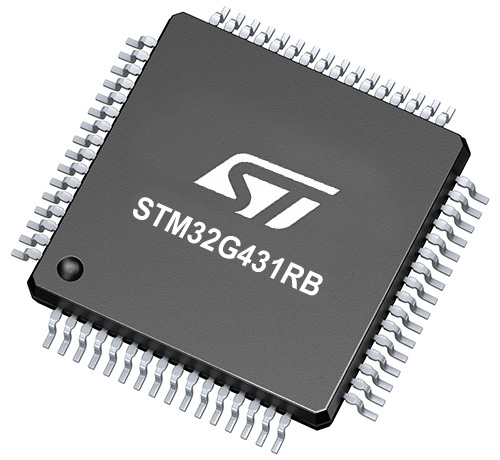
建筑
ARM Cortex-M4
MCU 内存 (KB)
128
硅供应商
STMicroelectronics
引脚数
64
RAM (字节)
32k
你完善了我!
配件
Click Shield for Nucleo-64 配备了两个专有的 mikroBUS™ 插座,使得所有的 Click board™ 设备都可以轻松地与 STM32 Nucleo-64 开发板连接。这样,Mikroe 允许其用户从不断增长的 Click boards™ 范围中添加任何功能,如 WiFi、GSM、GPS、蓝牙、ZigBee、环境传感器、LED、语音识别、电机控制、运动传感器等。您可以使用超过 1537 个 Click boards™,这些 Click boards™ 可以堆叠和集成。STM32 Nucleo-64 开发板基于 64 引脚封装的微控制器,采用 32 位 MCU,配备 ARM Cortex M4 处理器,运行速度为 84MHz,具有 512Kb Flash 和 96KB SRAM,分为两个区域,顶部区域代表 ST-Link/V2 调试器和编程器,而底部区域是一个实际的开发板。通过 USB 连接方便地控制和供电这些板子,以便直接对 Nucleo-64 开发板进行编程和高效调试,其中还需要额外的 USB 线连接到板子上的 USB 迷你接口。大多数 STM32 微控制器引脚都连接到了板子左右边缘的 IO 引脚上,然后连接到两个现有的 mikroBUS™ 插座上。该 Click Shield 还有几个开关,用于选择 mikroBUS™ 插座上模拟信号的逻辑电平和 mikroBUS™ 插座本身的逻辑电压电平。此外,用户还可以通过现有的双向电平转换器,使用任何 Click board™,无论 Click board™ 是否在 3.3V 或 5V 逻辑电压电平下运行。一旦将 STM32 Nucleo-64 开发板与我们的 Click Shield for Nucleo-64 连接,您就可以访问数百个工作于 3.3V 或 5V 逻辑电压电平的 Click boards™。
使用的MCU引脚
mikroBUS™映射器
“仔细看看!”
Click board™ 原理图

一步一步来
项目组装
软件支持
库描述
该库包含 4G LTE 2 Click - Voice 驱动程序的 API。
关键功能:
c4glte2voice_set_power_state- 此函数通过在高状态下切换PWR引脚的特定时间来设置所需的电源状态。c4glte2voice_set_sim_apn- 此函数为SIM卡设置APN。c4glte2voice_send_sms_text- 此函数向手机号发送文本消息。
开源
代码示例
完整的应用程序代码和一个现成的项目可以通过NECTO Studio包管理器直接安装到NECTO Studio。 应用程序代码也可以在MIKROE的GitHub账户中找到。
/*!
* @file main.c
* @brief 4G LTE 2 Voice Click Example.
*
* # Description
* Application example shows device capability of connecting to the network and
* sending SMS or TCP/UDP messages using standard "AT" commands.
*
* The demo application is composed of two sections :
*
* ## Application Init
* Initializes the driver, restarts the module and tests the communication.
*
* ## Application Task
* Application task is split in few stages:
* - C4GLTE2VOICE_CONFIGURE_FOR_NETWORK:
* Sets configuration to device to be able to connect to the network.
*
* - C4GLTE2VOICE_WAIT_FOR_CONNECTION:
* Waits for the network registration indicated via CREG URC event and then checks the connection status.
*
* - C4GLTE2VOICE_CONFIGURE_FOR_EXAMPLE:
* Sets the device configuration for sending SMS or TCP/UDP messages depending on the selected demo example.
*
* - C4GLTE2VOICE_EXAMPLE:
* Depending on the selected demo example, it sends an SMS message (in PDU or TXT mode) or TCP/UDP message.
*
* By default, the TCP/UDP example is selected.
*
* ## Additional Function
* - static void c4glte2voice_clear_app_buf ( void )
* - static err_t c4glte2voice_process ( void )
* - static void c4glte2voice_error_check( err_t error_flag )
* - static void c4glte2voice_log_app_buf ( void )
* - static err_t c4glte2voice_rsp_check ( void )
* - static err_t c4glte2voice_configure_for_network( void )
* - static err_t c4glte2voice_check_connection( void )
* - static err_t c4glte2voice_configure_for_example( void )
* - static err_t c4glte2voice_example( void )
*
* @note
* In order for the examples to work, user needs to set the APN and SMSC (SMS PDU mode only)
* of entered SIM card as well as the phone number (SMS mode only) to which he wants to send an SMS.
* Enter valid values for the following macros: SIM_APN, SIM_SMSC and PHONE_NUMBER_TO_MESSAGE.
* Example:
SIM_APN "internet"
SIM_SMSC "+381610401"
PHONE_NUMBER_TO_MESSAGE "+381659999999"
*
* @author Stefan Filipovic
*
*/
#include "board.h"
#include "log.h"
#include "c4glte2voice.h"
#include "generic_pointer.h"
#include "conversions.h"
// Example selection macros
#define EXAMPLE_TCP_UDP 0 // Example of sending messages to a TCP/UDP echo server
#define EXAMPLE_SMS 1 // Example of sending SMS to a phone number
#define DEMO_EXAMPLE EXAMPLE_TCP_UDP // Example selection macro
// SIM APN config
#define SIM_APN "" // Set valid SIM APN
// SMS example parameters
#define SIM_SMSC "" // Set valid SMS Service Center Address - only in SMS PDU mode
#define PHONE_NUMBER_TO_MESSAGE "" // Set Phone number to message
#define SMS_MODE "1" // SMS mode: "0" - PDU, "1" - TXT
// TCP/UDP example parameters
#define REMOTE_IP "77.46.162.162" // TCP/UDP echo server IP address
#define REMOTE_PORT "51111" // TCP/UDP echo server port
// Message content
#define MESSAGE_CONTENT "4G LTE 2 Voice Click board - demo example."
// Application buffer size
#define PROCESS_BUFFER_SIZE 300
/**
* @brief Example states.
* @details Predefined enum values for application example state.
*/
typedef enum
{
C4GLTE2VOICE_CONFIGURE_FOR_NETWORK = 1,
C4GLTE2VOICE_WAIT_FOR_CONNECTION,
C4GLTE2VOICE_CONFIGURE_FOR_EXAMPLE,
C4GLTE2VOICE_EXAMPLE
} c4glte2voice_example_state_t;
static c4glte2voice_t c4glte2voice;
static log_t logger;
/**
* @brief Application example variables.
* @details Variables used in application example.
*/
static char app_buf[ PROCESS_BUFFER_SIZE ] = { 0 };
static int32_t app_buf_len = 0;
static int32_t app_buf_cnt = 0;
static err_t error_flag;
static c4glte2voice_example_state_t example_state;
/**
* @brief Clearing application buffer.
* @details This function clears memory of application
* buffer and reset its length and counter.
*/
static void c4glte2voice_clear_app_buf ( void );
/**
* @brief Data reading function.
* @details This function reads data from device and
* appends it to the application buffer.
* @return @li @c 0 - Some data is read.
* @li @c -1 - Nothing is read.
* See #err_t definition for detailed explanation.
*/
static err_t c4glte2voice_process ( void );
/**
* @brief Check for errors.
* @details This function checks for different types of
* errors and logs them on UART or logs the response if no errors occured.
*/
static void c4glte2voice_error_check( err_t error_flag );
/**
* @brief Logs application buffer.
* @details This function logs data from application buffer.
*/
static void c4glte2voice_log_app_buf ( void );
/**
* @brief Response check.
* @details This function checks for response and
* returns the status of response.
* @return @li @c 0 - OK response.
* @li @c -2 - Timeout error.
* @li @c -3 - Command error.
* @li @c -4 - Unknown error.
* See #err_t definition for detailed explanation.
*/
static err_t c4glte2voice_rsp_check ( void );
/**
* @brief Configure device for connection to the network.
* @details Sends commands to configure and enable
* connection to the specified network.
* @return @li @c 0 - OK response.
* @li @c -2 - Timeout error.
* @li @c -3 - Command error.
* @li @c -4 - Unknown error.
* See #err_t definition for detailed explanation.
*/
static err_t c4glte2voice_configure_for_network( void );
/**
* @brief Wait for connection signal.
* @details Wait for connection signal from CREG URC.
* @return @li @c 0 - OK response.
* @li @c -2 - Timeout error.
* @li @c -3 - Command error.
* @li @c -4 - Unknown error.
* See #err_t definition for detailed explanation.
*/
static err_t c4glte2voice_check_connection( void );
/**
* @brief Configure device for example.
* @details Configure device for the specified example.
* @return @li @c 0 - OK response.
* @li @c -2 - Timeout error.
* @li @c -3 - Command error.
* @li @c -4 - Unknown error.
* See #err_t definition for detailed explanation.
*/
static err_t c4glte2voice_configure_for_example( void );
/**
* @brief Execute example.
* @details This function executes SMS or TCP/UDP example depending on the DEMO_EXAMPLE macro.
* @return @li @c 0 - OK response.
* @li @c -2 - Timeout error.
* @li @c -3 - Command error.
* @li @c -4 - Unknown error.
* See #err_t definition for detailed explanation.
*/
static err_t c4glte2voice_example( void );
void application_init ( void )
{
log_cfg_t log_cfg; /**< Logger config object. */
c4glte2voice_cfg_t c4glte2voice_cfg; /**< Click config object. */
/**
* Logger initialization.
* Default baud rate: 115200
* Default log level: LOG_LEVEL_DEBUG
* @note If USB_UART_RX and USB_UART_TX
* are defined as HAL_PIN_NC, you will
* need to define them manually for log to work.
* See @b LOG_MAP_USB_UART macro definition for detailed explanation.
*/
LOG_MAP_USB_UART( log_cfg );
log_init( &logger, &log_cfg );
log_info( &logger, " Application Init " );
// Click initialization.
c4glte2voice_cfg_setup( &c4glte2voice_cfg );
C4GLTE2VOICE_MAP_MIKROBUS( c4glte2voice_cfg, MIKROBUS_1 );
if ( UART_ERROR == c4glte2voice_init( &c4glte2voice, &c4glte2voice_cfg ) )
{
log_error( &logger, " Application Init Error. " );
log_info( &logger, " Please, run program again... " );
for ( ; ; );
}
c4glte2voice_set_power_state ( &c4glte2voice, C4GLTE2VOICE_POWER_STATE_OFF );
c4glte2voice_set_power_state ( &c4glte2voice, C4GLTE2VOICE_POWER_STATE_ON );
c4glte2voice_process( );
c4glte2voice_clear_app_buf( );
app_buf_len = 0;
app_buf_cnt = 0;
// Check communication
c4glte2voice_send_cmd( &c4glte2voice, C4GLTE2VOICE_CMD_AT );
error_flag = c4glte2voice_rsp_check( );
c4glte2voice_error_check( error_flag );
log_info( &logger, " Application Task " );
example_state = C4GLTE2VOICE_CONFIGURE_FOR_NETWORK;
}
void application_task ( void )
{
switch ( example_state )
{
case C4GLTE2VOICE_CONFIGURE_FOR_NETWORK:
{
if ( C4GLTE2VOICE_OK == c4glte2voice_configure_for_network( ) )
{
example_state = C4GLTE2VOICE_WAIT_FOR_CONNECTION;
}
break;
}
case C4GLTE2VOICE_WAIT_FOR_CONNECTION:
{
if ( C4GLTE2VOICE_OK == c4glte2voice_check_connection( ) )
{
example_state = C4GLTE2VOICE_CONFIGURE_FOR_EXAMPLE;
}
break;
}
case C4GLTE2VOICE_CONFIGURE_FOR_EXAMPLE:
{
if ( C4GLTE2VOICE_OK == c4glte2voice_configure_for_example( ) )
{
example_state = C4GLTE2VOICE_EXAMPLE;
}
break;
}
case C4GLTE2VOICE_EXAMPLE:
{
c4glte2voice_example( );
break;
}
default:
{
log_error( &logger, " Example state." );
break;
}
}
}
int main ( void )
{
/* Do not remove this line or clock might not be set correctly. */
#ifdef PREINIT_SUPPORTED
preinit();
#endif
application_init( );
for ( ; ; )
{
application_task( );
}
return 0;
}
static void c4glte2voice_clear_app_buf ( void )
{
memset( app_buf, 0, app_buf_len );
app_buf_len = 0;
app_buf_cnt = 0;
}
static err_t c4glte2voice_process ( void )
{
int32_t rx_size;
char rx_buff[ PROCESS_BUFFER_SIZE ] = { 0 };
rx_size = c4glte2voice_generic_read( &c4glte2voice, rx_buff, PROCESS_BUFFER_SIZE );
if ( rx_size > 0 )
{
int32_t buf_cnt = 0;
if ( ( app_buf_len + rx_size ) > PROCESS_BUFFER_SIZE )
{
c4glte2voice_clear_app_buf( );
return C4GLTE2VOICE_ERROR;
}
else
{
buf_cnt = app_buf_len;
app_buf_len += rx_size;
}
for ( int32_t rx_cnt = 0; rx_cnt < rx_size; rx_cnt++ )
{
if ( rx_buff[ rx_cnt ] != 0 )
{
app_buf[ ( buf_cnt + rx_cnt ) ] = rx_buff[ rx_cnt ];
}
else
{
app_buf_len--;
buf_cnt--;
}
}
return C4GLTE2VOICE_OK;
}
return C4GLTE2VOICE_ERROR;
}
static err_t c4glte2voice_rsp_check ( void )
{
uint32_t timeout_cnt = 0;
uint32_t timeout = 120000;
err_t error_flag = c4glte2voice_process( );
if ( ( C4GLTE2VOICE_OK != error_flag ) && ( C4GLTE2VOICE_ERROR != error_flag ) )
{
return error_flag;
}
while ( ( 0 == strstr( app_buf, C4GLTE2VOICE_RSP_OK ) ) &&
( 0 == strstr( app_buf, C4GLTE2VOICE_RSP_ERROR ) ) )
{
error_flag = c4glte2voice_process( );
if ( ( C4GLTE2VOICE_OK != error_flag ) && ( C4GLTE2VOICE_ERROR != error_flag ) )
{
return error_flag;
}
if ( timeout_cnt++ > timeout )
{
c4glte2voice_clear_app_buf( );
return C4GLTE2VOICE_ERROR_TIMEOUT;
}
Delay_ms ( 1 );
}
if ( strstr( app_buf, C4GLTE2VOICE_RSP_OK ) )
{
return C4GLTE2VOICE_OK;
}
else if ( strstr( app_buf, C4GLTE2VOICE_RSP_ERROR ) )
{
return C4GLTE2VOICE_ERROR_CMD;
}
else
{
return C4GLTE2VOICE_ERROR_UNKNOWN;
}
}
static void c4glte2voice_error_check( err_t error_flag )
{
switch ( error_flag )
{
case C4GLTE2VOICE_OK:
{
c4glte2voice_log_app_buf( );
break;
}
case C4GLTE2VOICE_ERROR:
{
log_error( &logger, " Overflow!" );
break;
}
case C4GLTE2VOICE_ERROR_TIMEOUT:
{
log_error( &logger, " Timeout!" );
break;
}
case C4GLTE2VOICE_ERROR_CMD:
{
log_error( &logger, " CMD!" );
break;
}
case C4GLTE2VOICE_ERROR_UNKNOWN:
default:
{
log_error( &logger, " Unknown!" );
break;
}
}
c4glte2voice_clear_app_buf( );
Delay_ms ( 500 );
}
static void c4glte2voice_log_app_buf ( void )
{
for ( int32_t buf_cnt = 0; buf_cnt < app_buf_len; buf_cnt++ )
{
log_printf( &logger, "%c", app_buf[ buf_cnt ] );
}
}
static err_t c4glte2voice_configure_for_network( void )
{
err_t func_error = C4GLTE2VOICE_OK;
// Deregister from network
#define DEREGISTER_FROM_NETWORK "2"
c4glte2voice_send_cmd_with_parameter( &c4glte2voice, C4GLTE2VOICE_CMD_COPS, DEREGISTER_FROM_NETWORK );
error_flag = c4glte2voice_rsp_check();
func_error |= error_flag;
c4glte2voice_error_check( error_flag );
// Set SIM APN
c4glte2voice_set_sim_apn( &c4glte2voice, SIM_APN );
error_flag = c4glte2voice_rsp_check();
func_error |= error_flag;
c4glte2voice_error_check( error_flag );
// Enable full functionality
#define FULL_FUNCTIONALITY "1"
c4glte2voice_send_cmd_with_parameter( &c4glte2voice, C4GLTE2VOICE_CMD_CFUN, FULL_FUNCTIONALITY );
error_flag = c4glte2voice_rsp_check();
func_error |= error_flag;
c4glte2voice_error_check( error_flag );
// Automatic registration
#define AUTOMATIC_REGISTRATION "0"
c4glte2voice_send_cmd_with_parameter( &c4glte2voice, C4GLTE2VOICE_CMD_COPS, AUTOMATIC_REGISTRATION );
error_flag = c4glte2voice_rsp_check();
func_error |= error_flag;
c4glte2voice_error_check( error_flag );
// Enable network registartion
#define ENABLE_REG "2"
c4glte2voice_send_cmd_with_parameter( &c4glte2voice, C4GLTE2VOICE_CMD_CREG, ENABLE_REG );
error_flag = c4glte2voice_rsp_check();
func_error |= error_flag;
c4glte2voice_error_check( error_flag );
return func_error;
}
static err_t c4glte2voice_check_connection( void )
{
#define CONNECTED "+CREG: 1"
c4glte2voice_process( );
if ( strstr( app_buf, CONNECTED ) )
{
Delay_ms ( 100 );
c4glte2voice_process( );
c4glte2voice_log_app_buf( );
log_printf( &logger, "\r\n" );
c4glte2voice_clear_app_buf( );
// Check signal quality
c4glte2voice_send_cmd( &c4glte2voice, C4GLTE2VOICE_CMD_CSQ );
error_flag = c4glte2voice_rsp_check( );
c4glte2voice_error_check( error_flag );
return error_flag;
}
return C4GLTE2VOICE_ERROR;
}
static err_t c4glte2voice_configure_for_example( void )
{
err_t func_error = C4GLTE2VOICE_OK;
#if ( DEMO_EXAMPLE == EXAMPLE_TCP_UDP )
#define ACTIVATE_PDP_CONTEXT "1,1"
c4glte2voice_send_cmd_with_parameter( &c4glte2voice, C4GLTE2VOICE_CMD_CGACT, ACTIVATE_PDP_CONTEXT );
error_flag = c4glte2voice_rsp_check( );
func_error |= error_flag;
c4glte2voice_error_check( error_flag );
#elif ( DEMO_EXAMPLE == EXAMPLE_SMS )
c4glte2voice_send_cmd_with_parameter( &c4glte2voice, C4GLTE2VOICE_CMD_CMGF, SMS_MODE );
error_flag = c4glte2voice_rsp_check( );
func_error |= error_flag;
c4glte2voice_error_check( error_flag );
#else
#error "No demo example selected"
#endif
return func_error;
}
static err_t c4glte2voice_example( void )
{
err_t func_error = C4GLTE2VOICE_OK;
#if ( DEMO_EXAMPLE == EXAMPLE_TCP_UDP )
char cmd_buf[ 100 ] = { 0 };
char urc_buf[ 20 ] = { 0 };
uint16_t timeout_cnt = 0;
uint16_t timeout = 30000;
uint8_t * __generic_ptr socket_num_buf = 0;
uint8_t tcp_socket_num[ 2 ] = { 0 };
uint8_t udp_socket_num[ 2 ] = { 0 };
// Create TCP socket
#define RSP_USOCR "+USOCR: "
#define TCP_PROTOCOL "6"
c4glte2voice_send_cmd_with_parameter( &c4glte2voice, C4GLTE2VOICE_CMD_USOCR, TCP_PROTOCOL );
error_flag = c4glte2voice_rsp_check( );
func_error |= error_flag;
socket_num_buf = strstr( app_buf, RSP_USOCR ) + strlen ( RSP_USOCR );
tcp_socket_num[ 0 ] = *socket_num_buf;
c4glte2voice_error_check( error_flag );
// Create UDP socket
#define UDP_PROTOCOL "17"
c4glte2voice_send_cmd_with_parameter( &c4glte2voice, C4GLTE2VOICE_CMD_USOCR, UDP_PROTOCOL );
error_flag = c4glte2voice_rsp_check( );
func_error |= error_flag;
socket_num_buf = strstr( app_buf, RSP_USOCR ) + strlen ( RSP_USOCR );
udp_socket_num[ 0 ] = *socket_num_buf;
c4glte2voice_error_check( error_flag );
// Connect TCP socket to remote IP and port
strcpy( cmd_buf, tcp_socket_num );
strcat( cmd_buf, ",\"" );
strcat( cmd_buf, REMOTE_IP );
strcat( cmd_buf, "\"," );
strcat( cmd_buf, REMOTE_PORT );
c4glte2voice_send_cmd_with_parameter( &c4glte2voice, C4GLTE2VOICE_CMD_USOCO, cmd_buf );
error_flag = c4glte2voice_rsp_check( );
func_error |= error_flag;
c4glte2voice_error_check( error_flag );
// Connect UDP socket to remote IP and port
strcpy( cmd_buf, udp_socket_num );
strcat( cmd_buf, ",\"" );
strcat( cmd_buf, REMOTE_IP );
strcat( cmd_buf, "\"," );
strcat( cmd_buf, REMOTE_PORT );
c4glte2voice_send_cmd_with_parameter( &c4glte2voice, C4GLTE2VOICE_CMD_USOCO, cmd_buf );
error_flag = c4glte2voice_rsp_check( );
func_error |= error_flag;
c4glte2voice_error_check( error_flag );
// Get message length
uint8_t message_len_buf[ 5 ] = { 0 };
uint16_t message_len = strlen( MESSAGE_CONTENT );
uint16_to_str( message_len, message_len_buf );
l_trim( message_len_buf );
r_trim( message_len_buf );
// Write message to TCP socket
strcpy( cmd_buf, tcp_socket_num );
strcat( cmd_buf, "," );
strcat( cmd_buf, message_len_buf );
strcat( cmd_buf, ",\"" );
strcat( cmd_buf, MESSAGE_CONTENT );
strcat( cmd_buf, "\"" );
c4glte2voice_send_cmd_with_parameter( &c4glte2voice, C4GLTE2VOICE_CMD_USOWR, cmd_buf );
error_flag = c4glte2voice_rsp_check( );
func_error |= error_flag;
c4glte2voice_error_check( error_flag );
// Read response message from TCP socket
#define URC_READ_SOCKET_DATA_TCP "+UUSORD: "
strcpy( urc_buf, URC_READ_SOCKET_DATA_TCP );
strcat( urc_buf, tcp_socket_num );
for ( ; ; )
{
c4glte2voice_process( );
uint8_t * __generic_ptr start_response_buf = strstr( app_buf, urc_buf );
if ( start_response_buf )
{
Delay_ms ( 100 );
c4glte2voice_process( );
uint8_t response_len_buf[ 5 ] = { 0 };
char * __generic_ptr start_response_len = strstr( start_response_buf, "," ) + 1;
memcpy ( response_len_buf, start_response_len, app_buf_len - ( start_response_len - app_buf ) );
strcpy( cmd_buf, tcp_socket_num );
strcat( cmd_buf, "," );
strcat( cmd_buf, response_len_buf );
c4glte2voice_log_app_buf( );
c4glte2voice_clear_app_buf( );
c4glte2voice_send_cmd_with_parameter( &c4glte2voice, C4GLTE2VOICE_CMD_USORD, cmd_buf );
error_flag = c4glte2voice_rsp_check( );
func_error |= error_flag;
c4glte2voice_error_check( error_flag );
break;
}
if ( timeout_cnt++ > timeout )
{
break;
}
Delay_ms ( 1 );
}
timeout_cnt = 0;
// Write message to UDP socket
strcpy( cmd_buf, udp_socket_num );
strcat( cmd_buf, "," );
strcat( cmd_buf, message_len_buf );
strcat( cmd_buf, ",\"" );
strcat( cmd_buf, MESSAGE_CONTENT );
strcat( cmd_buf, "\"" );
c4glte2voice_send_cmd_with_parameter( &c4glte2voice, C4GLTE2VOICE_CMD_USOWR, cmd_buf );
error_flag = c4glte2voice_rsp_check( );
func_error |= error_flag;
c4glte2voice_error_check( error_flag );
// Read response message from UDP socket
#define URC_READ_SOCKET_DATA_UDP "+UUSORD: "
strcpy( urc_buf, URC_READ_SOCKET_DATA_UDP );
strcat( urc_buf, udp_socket_num );
for ( ; ; )
{
c4glte2voice_process( );
uint8_t * __generic_ptr start_response_buf = strstr( app_buf, urc_buf );
if ( start_response_buf )
{
Delay_ms ( 100 );
c4glte2voice_process( );
uint8_t response_len_buf[ 5 ] = { 0 };
char * __generic_ptr start_response_len = strstr( start_response_buf, "," ) + 1;
memcpy ( response_len_buf, start_response_len, app_buf_len - ( start_response_len - app_buf ) );
strcpy( cmd_buf, udp_socket_num );
strcat( cmd_buf, "," );
strcat( cmd_buf, response_len_buf );
c4glte2voice_log_app_buf( );
c4glte2voice_clear_app_buf( );
c4glte2voice_send_cmd_with_parameter( &c4glte2voice, C4GLTE2VOICE_CMD_USORD, cmd_buf );
error_flag = c4glte2voice_rsp_check( );
func_error |= error_flag;
c4glte2voice_error_check( error_flag );
break;
}
if ( timeout_cnt++ > timeout )
{
break;
}
Delay_ms ( 1 );
}
// Close TCP socket
c4glte2voice_send_cmd_with_parameter( &c4glte2voice, C4GLTE2VOICE_CMD_USOCL, tcp_socket_num );
error_flag = c4glte2voice_rsp_check( );
func_error |= error_flag;
c4glte2voice_error_check( error_flag );
// Close UDP socket
c4glte2voice_send_cmd_with_parameter( &c4glte2voice, C4GLTE2VOICE_CMD_USOCL, udp_socket_num );
error_flag = c4glte2voice_rsp_check( );
func_error |= error_flag;
c4glte2voice_error_check( error_flag );
Delay_ms ( 1000 );
Delay_ms ( 1000 );
Delay_ms ( 1000 );
Delay_ms ( 1000 );
Delay_ms ( 1000 );
#elif ( DEMO_EXAMPLE == EXAMPLE_SMS )
// Check SMS mode
#define CMGF_PDU "+CMGF: 0"
#define CMGF_TXT "+CMGF: 1"
c4glte2voice_send_cmd_check( &c4glte2voice, C4GLTE2VOICE_CMD_CMGF );
error_flag = c4glte2voice_rsp_check( );
func_error |= error_flag;
if ( strstr( app_buf, CMGF_PDU ) )
{
c4glte2voice_error_check( error_flag );
// Send SMS in PDU mode
c4glte2voice_send_sms_pdu( &c4glte2voice, SIM_SMSC, PHONE_NUMBER_TO_MESSAGE, MESSAGE_CONTENT );
error_flag = c4glte2voice_rsp_check( );
func_error |= error_flag;
}
else if ( strstr( app_buf, CMGF_TXT ) )
{
c4glte2voice_error_check( error_flag );
// Send SMS in TXT mode
c4glte2voice_send_sms_text ( &c4glte2voice, PHONE_NUMBER_TO_MESSAGE, MESSAGE_CONTENT );
error_flag = c4glte2voice_rsp_check( );
func_error |= error_flag;
}
c4glte2voice_error_check( error_flag );
// 30 seconds delay
Delay_ms ( 1000 );
Delay_ms ( 1000 );
Delay_ms ( 1000 );
Delay_ms ( 1000 );
Delay_ms ( 1000 );
Delay_ms ( 1000 );
Delay_ms ( 1000 );
Delay_ms ( 1000 );
Delay_ms ( 1000 );
Delay_ms ( 1000 );
Delay_ms ( 1000 );
Delay_ms ( 1000 );
Delay_ms ( 1000 );
Delay_ms ( 1000 );
Delay_ms ( 1000 );
Delay_ms ( 1000 );
Delay_ms ( 1000 );
Delay_ms ( 1000 );
Delay_ms ( 1000 );
Delay_ms ( 1000 );
Delay_ms ( 1000 );
Delay_ms ( 1000 );
Delay_ms ( 1000 );
Delay_ms ( 1000 );
Delay_ms ( 1000 );
Delay_ms ( 1000 );
Delay_ms ( 1000 );
Delay_ms ( 1000 );
Delay_ms ( 1000 );
Delay_ms ( 1000 );
#else
#error "No demo example selected"
#endif
return func_error;
}
// ------------------------------------------------------------------------ END
额外支持
资源
类别:GSM/LTE
